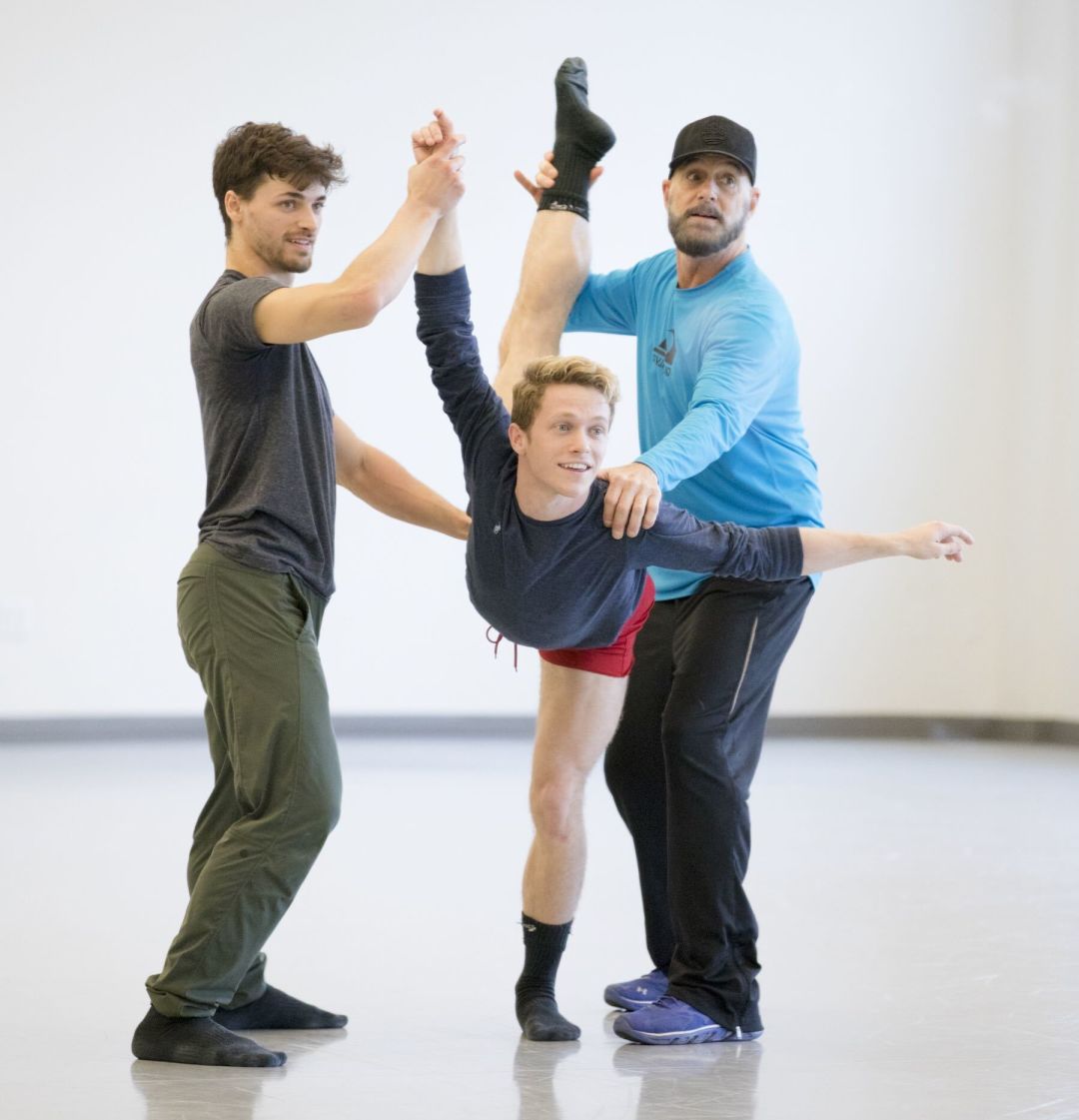James Canfield Reimagines A Streetcar Named Desire for NW Dance Project

James Canfield (right) in rehearsal with Anthony Pucci and Kody Jauron
Blanche DuBois is not Mrs. Robinson, but you can see the through-line. Older woman pursues younger man. Perfume-stained desperation meets put-upon glamor.
In his newest work for NW Dance Project, James Canfield keeps connections like these front-of-mind. Sketches of Connotation (retitled last-minute from Each Desperate Choice) is the Oregon Ballet Theatre founder’s characteristically provocative stab at a Streetcar Named Desire for the lauded contemporary dance company. The penultimate bit of choreography in the 40-minute piece? A passionate duet between Stanley (Anthony Pucci) and Blanche (Colleen Loverde), set to a cover of “The Sound of Silence” by Chicago metal band Disturbed.
“Is anybody gonna get all the reasons why I brought that music in? I don’t really care,” Canfield says, though it’s tough to imagine an audience member who won’t draw a straight line from “Hello, darkness, my old friend” to The Graduate. “You’re gonna enjoy the song if you don’t like what you see.”
Canfield's piece is part of NW Dance Project’s Summer Premieres, which will also feature a duet called Save Me the Plums from artistic director Sarah Slipper and All’s Been Said, a work about climate change by German choreographer Felix Landerer (rumor has it there will be polar bears).
For Canfield—who returned to Portland in 2017 after eight years as artistic director at Nevada Ballet Theatre—inspiration came from a lifelong love of Tennessee Williams and the thematic possibilities of contemporary dance. Sketches of Connotation quilts together a pop score from multiple decades—“Que Será Será,” “Ode to Billie Joe,” “House of the Rising Sun”—to highlight the fraught interpersonal dynamics in Williams’s play, with a special emphasis on gender politics.
“In ballet companies, a woman on pointe has to depend on the male to support her,” Canfield says. “In contemporary dance, women don’t have to be as supported. It makes them a little more grounded and physical in their ability.”
From the looks of a late-process rehearsal, Loverde is having no trouble exploiting that power shift. At several points in the “Sound of Silence” section, Canfield reeled her in, asking for “more rag doll” from his strikingly muscular Blanche.
Er, his strikingly muscular not-Blanche. Canfield is billing his dancers as nameless ciphers—“sketches.” Stella and Blanche are “Two Sisters.” Stanley and Mitch, “Two Friends.” A small ensemble comprising neighbors, poker players, and half-remembered lovers are “The Others.”
“I could probably recite the entire movie of Streetcar,” Canfield says, considering why he ditched Williams’ names. “When you see who these characters really are, I guess I couldn’t honestly say me and my interpretation earned it yet.”
Not for a lack of imagination. Other quintessentially Canfield touches include an all-white stage (meant to evoke a mental asylum) and a symbolically thick, toy-sized streetcar.
The piece has no certain future beyond three performances at PSU’s Lincoln Hall, but Canfield says he hopes to someday expand it into a full-fledged adaptation. For now, he’s sitting on an arresting piece of choreography whose connotations stretch from Anne Bancroft to Doris Day to a heavy metal band from Chicago. “I don’t tell the truth, I tell what ought to be the truth,” Blanche tells Mitch toward the end of Streetcar. “And if that’s sinful, let me damned for it!”
One gets the feeling she and Canfield would have a lot to talk about.
Summer Premieres
June 13–15, Lincoln Hall, $34–58




